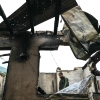Then-Vice President-elect Vance visits Fox Information Sunday with anchor Shannon Bream in Washington, D.C., on Jan. 11.
Paul Morigi/Getty Pictures
conceal caption
toggle caption
Paul Morigi/Getty Pictures
MUMBAI India — Vice President Vance mentioned that the present escalation between India and Pakistan was “fundamentally none of our business,” as they traded blows in a single day Thursday and early Friday night utilizing drones and projectiles, reaching locations that haven’t been focused in many years on both aspect.
Vance spoke on Fox Information late Thursday, in response to a query about if the Trump administration was apprehensive about nuclear battle. “We want this thing to de-escalate as quickly as possible,” and added: “We can’t control these countries though.”
“What we can do is try to encourage these folks to de-escalate a little bit, but we’re not going to get involved in the middle of a war that’s fundamentally none of our business and has nothing to do with America’s ability to control it.”
Vance mentioned the administration was pursuing de-escalation by diplomatic channels and mentioned he didn’t assume nuclear conflict was a probable state of affairs. Secretary of State Marco Rubio mentioned Thursday he spoke to the Indian overseas minister and the Pakistani prime minister.
“This might embolden both sides,” Praveen Donthi, an India analyst for the Worldwide Disaster Group, mentioned of Vance’s feedback. He mentioned the escalation between India and Pakistan has been “breaching a new threshold every day, and we don’t know when it is going to stop.”
Vance’s feedback signaled a extra hands-off overseas coverage, mentioned Arifa Noor, a columnist for the liberal newspaper Daybreak. Throughout earlier escalations in 2019 and 1999, Washington labored intently to dial down tensions.
The issue, she mentioned, is “I do not think that there is another power that can step into this vacuum” at the same time as the 2 nations had lengthy relied on the U.S. for “stepping in and talking the two countries off the ledge.” Now greater than ever, she described them as “two nuclear powers that are inherently in a very unstable situation.”
She mentioned Pakistan usually sought worldwide intervention as a result of it noticed itself because the weaker get together in its decades-long disaster with India, largely over the disputed area of Kashmir. This Himalayan territory is split between each nations, and claimed by each in its entirety.
The present spherical of tensions started after gunmen killed 26 individuals, largely Hindu vacationers, in Indian-administered Kashmir in late April. India insisted the gunmen had been proxies for the Pakistani navy. Pakistan denies any connection to the assault.
In a single day Wednesday, India launched missile strikes throughout Pakistan, in what it mentioned was retaliation. Pakistan mentioned it downed 5 Indian plane. The 2 sides have traded drone strikes and projectiles since then.
Donthi, of the Disaster Group, mentioned Vance’s feedback advised that Washington could also be sympathetic to India’s grievances, which “seems to have come to the conclusion that letting this play out a bit more is actually contributing to that effort to confront the threat of terror.”

Locals stand on the particles of destroyed buildings at a authorities well being and training advanced in Muridke, Pakistan, on Wednesday, after Indian strikes.
Farooq Naeem/AFP by way of Getty Pictures
conceal caption
toggle caption
Farooq Naeem/AFP by way of Getty Pictures
On Friday, a minimum of two projectiles landed close to a navy cantonment within the Pakistani metropolis of Okara. Residents filmed one careering to the bottom, spinning throughout a discipline whereas emitting plumes of smoke as younger males dashed out of the best way. Two residents independently described the incident to NPR, however each requested anonymity as a result of they didn’t need to anger Pakistani authorities, which haven’t commented on the incident.
In a briefing Friday, an Indian navy officer mentioned her nation responded to what she termed an “escalation” by its rival by sending drones to 4 places in Pakistan. The escalation was a reference to Pakistani drones focusing on Indian cities in a single day alongside a 760-mile stretch of border, from the desert city of Jaisalmer in India’s northwest, to Poonch and Jammu within the Himalayan peaks of Indian-held Kashmir — locations that haven’t been focused in battle for many years.
“There were dozens of fireballs in the sky,” mentioned Gowher Ahmad, 43, of Jammu metropolis, of the in a single day barrage. Friday was quiet, however Ahmad mentioned he feared the evening.
Jaspreet Kaur, from the border village of Ajote, mentioned a lot of the 10,000 residents had fled. “The rest of us are huddled up in the basement of a three-story building,” she mentioned. Karamat Hussain, from one other border village, Khari, mentioned many residents could not flee, as a result of they needed to care for his or her livestock, like his aged dad and mom.
As violence continues, India seems to be cracking down extra intently on critics. Mirwaiz Umar Farooq, a distinguished Kashmiri preacher who advocates independence for the territory, mentioned on X that he was not allowed to attend communal Muslim Friday prayers in Indian-held Kashmir. He shared a video of his earlier Friday sermon, and wrote, “I urge both the countries to urgently de-escalate and not to tread on this dangerous path, which can only lead to destruction.”
The social media community X additionally mentioned it had obtained “executive orders” from the Indian authorities to dam greater than 8,000 accounts, together with information organizations, it mentioned in a message on its world affairs account. These blocked appeared to incorporate Anuradha Bhasin, a distinguished Kashmir-based journalist, and The Wire, an impartial information website based mostly in New Delhi. Indian authorities didn’t reply to requests for remark.
Bilal Kuchay contributed reporting from Srinagar, in India-administered Kashmir.





